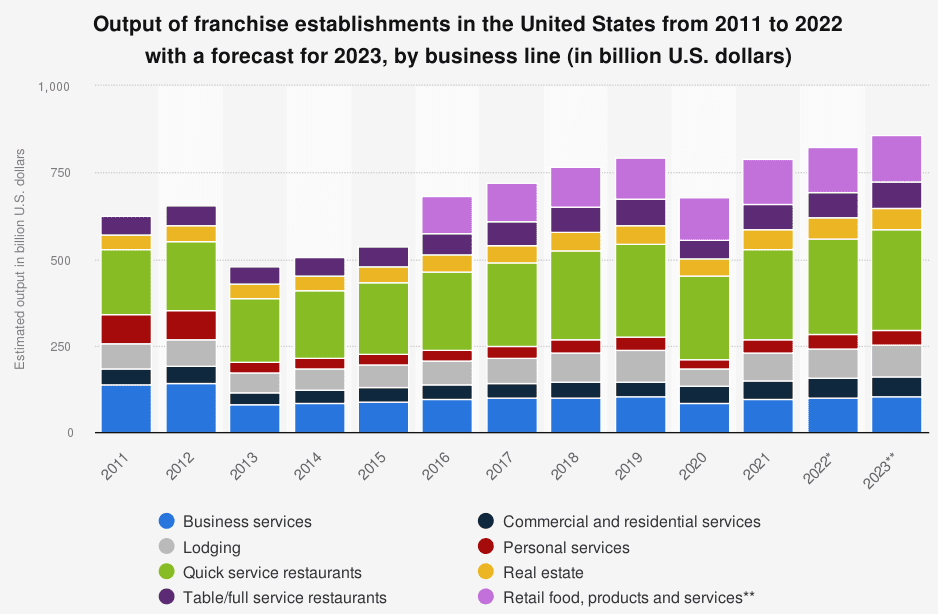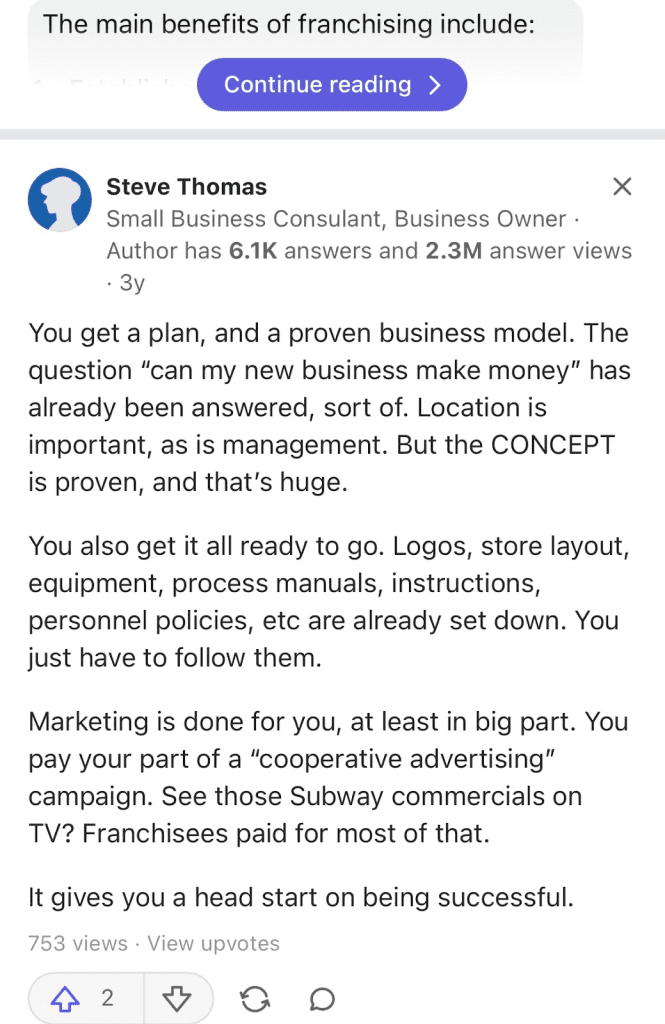Franchising is a way to get your business out with little risk (boasting 5X the average success rate vs independent startups). It is because it builds on a working, existing system with a trusted reputation. By acquiring a profitable passive income franchise, you make money without being actively involved in your business.

However, the beautiful rose that is franchising is not without its thorns. Start-up costs can be overwhelming, and some franchisors may impose stringent restrictions. Join us as we delve into the fascinating world of franchising, where success becomes attainable and financial security awaits.
Essential Steps for Establishing a Passive Income Franchise
It takes 20 years to build a reputation and five years to ruin it.
Warren Buffet
Do Thorough Passive Income Franchise Research
You should start every business venture with good research. Many franchises don’t allow absentee ownership; without that, you can’t make whatever business you acquire a passive income franchise.
There are several things to look out for, from finance to restrictions. Some of them include
- Financial Requirements: This information will help you decide if the franchise is something you can afford. Consider the minimum liquid capital, franchise purchase fees, royalties, and other additional expenses. You should also compare the addition of the costs to the franchise’s yearly revenue to determine if it’s worth it.
- Permitted Ownership Type: Some businesses, like Chick-fil-A, mandate that franchisees run the businesses themselves. So, you will want to ensure your pick allows absentee or semi-absentee ownership.
- Requirement of Special Skills or Licenses: Looking to acquire a franchise will expose you to unfamiliar industries. So, you can either avoid them or try your best to develop cross-functional expertise.
Marketplaces like Franchise Direct, and BizBuySell.com (general business marketplace with franchise listings), can help you with your search. However, you should consider hiring a franchise broker if that doesn’t cut it for you.
Source for Funds
Since it’s an extra source of income, you may go for low-cost franchises. However, to aim higher, you need to source funds to finance your franchise acquisition. Also, regardless of your choice, you may need to consider rent money.
Depending on your financial stance, you could contact family, find investors or consider SBA loans.
Apply Online
Once you have decided on a franchise, head to their website and try to locate their application form. These forms function as a screening process. The franchisors determine if you are a good fit based on the information you provide in the form.
Typically, you must enter personal information such as your contact information and employment history. You will also be required to input some financial information, such as your assets and liabilities. It is so the franchisor can decide if you are financially capable of being a franchisee.
Your financial institution will verify the financial information you provide. The franchisor will review your form and reply with their decision.
4. Sign a Franchise Agreement
What you do today can improve all your tomorrows.
Ralph Marston
If the franchisor sees you as a good fit after the application, the next step would be signing an agreement. The terms may include the franchise’s standards, territory, and intellectual property rights.
You should read through the contract carefully and hire a franchise lawyer. If you are comfortable with the terms, sign the agreement.
Hire Your Franchise Employees
Hiring the right people may take a reasonable amount of effort. It is crucial because your business will be in the hands of your employees since it’s a passive income franchise. You won’t have the time to micromanage everyone and everything.
After carefully selecting skilled and trusted people, you will train them to understand how the system works.

3 Ideal Low-Cost Franchises
“The best passive income franchise” may be seen through the lens of subjectivity. Your personal interests, skills, and investment costs may make you a better passive income franchise for you. However, this list is perfect if you are not looking to invest much money.
- Social Owl is a fast-growing business. It deals with social media and reputation management, letting you offer related services from your home. You can set your pricing plans. However, with a minimum of $297 per month, you can earn as much as you want. You can put your price at $300 per resale. The money is all yours.
- Cruise Planners is a home-based travel agency franchise. As a franchisee, you’ll learn how to become a travel agent and manage your travel agency. The standard franchise fee is $10,995, currently discounted at $8,995. As for the earnings, it all depends on you and how much time and effort you invest. Cruise Planners also features training to help franchisees increase their earning power.
- SiteSwan is a program allowing you to offer small businesses website solutions. It provides all the needed tools, meaning it doesn’t require you to have any relevant skills. SiteSwan allows you to use its resources to build an exclusive business without interference. You only have to pay a flat licensing fee to use the software, starting at $149 monthly.
5 Recommended Apps for Your Passive Income Franchise

- Slack is an instant messaging software that boosts employee collaboration and teamwork productivity. Slack is available for free. However, you can access its pro plan for $7.25 and business+ for $12.50.
- ZoomShift is a platform for building your employees’ schedules. You get access to a free demo to understand how the software works. The starter price is $2 per active user and $4 per active user for premium.
- Basecamp simplifies your job of managing people, projects, and tasks. You can choose the monthly plan of $15 per user or unlimited users plans at $299 monthly. For both plans, there is a 30-day free trial.
- Planable is a tool effective for social media management and collaboration. You get 50 free posts, and the pro plan costs $22 per user.
- Zoho CRM is a top-tier customer management tool. It allows a free trial with fees ranging from $12 to $45.
Franchising can be an excellent addition to your income stream if you do due diligence and play your cards right. It is a great opportunity, but it has its cons. If the pros outweigh the cons in your books, go for it! Moreover, you can always try passive franchise investing with as little as $500, if you can’t stomach the cons.











